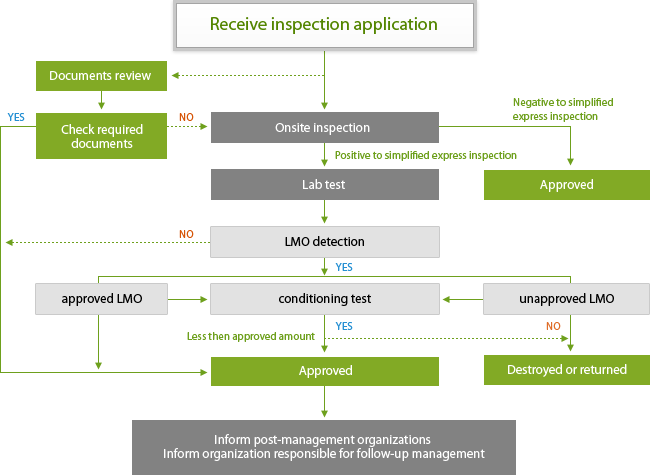


Rural Administration Agency will be responsible for field cultivation study and approval, and evaluation of hazardousness
Responsibilities pertaining to LMO import and production approval shall be divided among relevant organizations depending on the purpose of their use.
- Those for feeds will be under the responsibility of National Agricultural Products Quality Management Service, those for feed under the responsibility of Korea Seed & Variety Service, and those for feed under the responsibility of APQA
Supervise whether LMOs that went through the customs are unintentionally released to the environment during transportation and distribution, or used other than approved purpose
- Those for feeds will be under the responsibility of National Agricultural Products Quality Management Service, those for feed under the responsibility of Korea Seed & Variety Service, and those for feed under the responsibility of APQA.
* Management of GMO marking in accordance with Agricultural Products Quality Control Act and Quality Control of Fishery Products Act

LMO Acts (ACT ON THE PRESERVATION, MANAGEMENT AND UTILIZATION OF AGRICULTURAL GENETIC RESOURCES)
Those that are imported for the purposes of seeds or for feeds or feed processing in the original state and have concern for having influence over the crop cultivation environment when released to the environment
- Agricultural LMO products that are developed and approved world-wide and have possibility of commercial distribution which include 24 crops such as bean, corn, cotton and canola
[A LIST OF AGRICULTURAL LMOS SUBJECT TO BORDER INSPECTION]
| items | Scientific name |
|---|---|
| Potato | Solanum tuberosum |
| Others | LMOs for seeds and stock feeds which raise concerns if released to the environment in their original state and which were designated by Director-General of APQA |
Any person intending to import agricultural LMO must get import permits in advance and submit application forLMO inspection to APQA.
Crops and number of LMO events of each crop which can be imported at present
Agricultural commodities subject to LMO inspection will be inspected by APQA on inclusion of LMO, without importer having to apply for inspection.

The inspection procedure is as follows: documents review (check import permit and registrations) → on-site survey (simplified express inspection, sample collection and marking check etc.) → in-depth lab testing (check inclusion of LMO)
Document review: Check commodities subject to inspection, import permit, inspection certificate.
On-site survey
Visit the site and check the actual item and volume
In case of import permitted LMO, check the markings and supervise and oversee appropriateness of handling before clearance
Collect samples to assess inclusion of LMO and carry out simplified express examination
Laboratory Test
Conduct PCR on samples handed over by on-site inspector
In case of checking unintentional mixing
※ Cases in which sample collection or lab test can be exempted during the on-site inspection
1. In case a test certificate issued by the exporting government is attached or description that the article is not LMO is included in the phytosanitary certificate;
2. In case divided production and distribution management certificate or a certificate approved by the exporting or producing government is attached; and
3. In case it is a standard sample to be submitted for risk assessment
If approved as a result of inspection
If destroyed or returned as a result of inspection
